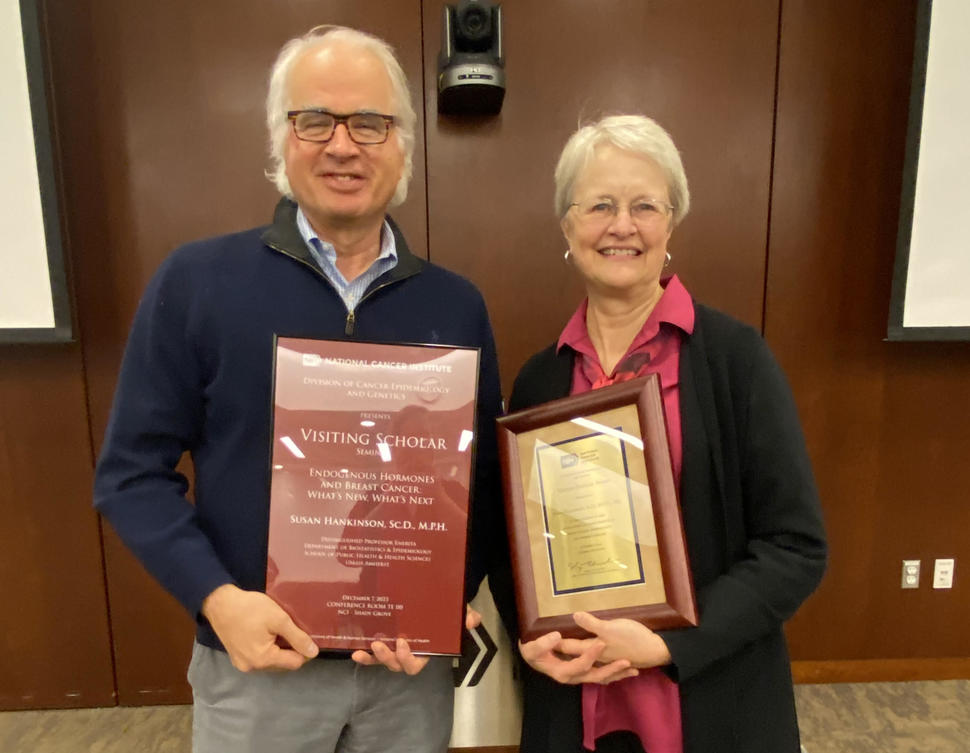Susan Hankinson Delivers Seminar on Endogenous Hormones and Breast Cancer Research
, by Sylvia Roberts
In December 2023, Susan Hankinson, Sc.D., Distinguished Professor Emerita of Epidemiology at the University of Massachusetts, Amherst, School of Public Health and Health Sciences, spent two days at DCEG as a Visiting Scholar, presenting her research and engaging with fellows and investigators at several roundtable discussions. Her visit was hosted by Gretchen Gierach, Ph.D., M.P.H., Director and senior investigator, Integrated Tumor Epidemiology Branch (ITEB).
In her seminar, entitled “Endogenous hormones and breast cancer: What’s new, What’s next?” Dr. Hankinson highlighted her landmark findings from the Nurses’ Health Study on the role of endogenous hormones in breast cancer etiology and discussed ongoing efforts to evaluate biomarkers to improve risk prediction models with the ultimate goal of informing recommendations for screening and chemoprevention. In particular, she is using the Biomarkers in Breast Cancer Risk Prediction (B2Risk) Study, to look at the benefit of adding multiple hormones, as well as polygenic risk scores (PRS) and mammographic density for several breast cancer risk prediction models.
DCEG hosted two roundtable discussions as part of the visit. During “Biomarkers and Cancer Risk and Prediction,” co-chaired by Earl Stadtman Investigators Mustapha Abubakar, M.D., Ph.D., ITEB, and Megan Clarke Ph.D., M.H.S., Clinical Genetics Branch, Dr. Hankinson highlighted the opportunities and complexities of studying biomarkers from etiology to treatment and monitoring of disease. The discussion covered topics including the need for standardization of biomarker measurements across studies, different goals of biomarker research, ranging from etiology to clinical translation, and how to ensure equitable access to new technologies and innovations to avoid exacerbating existing health disparities.
On the second day of her visit, Dr. Hankinson led an animated discussion with the Women Scientist Advisors on “Mentoring, Career Advancement, and Career Trajectories in Epidemiology” chaired by Aimée R. Kreimer, Ph.D., senior investigator, Infections and Immunoepidemiology Branch, and Marie-Josèphe Horner, Ph.D., staff scientist, Trans-Divisional Research Program. As the first woman in the Channing/Harvard Laboratory promoted to full professor, Dr. Hankinson was able to provide thought-provoking insights on responding to barriers and serving as an advocate for oneself and other women. She emphasized the importance of work-life balance, sharing that pottery “lets her brain rest,” while keeping in mind that efficient prioritization, time management, and preparation are key to building a robust research portfolio.
Dr. Hankinson also had the opportunity to interact with members of DCEG informally, including attending a Fellows Lunch and Learn Session, hosted by iCURE scholar Quiera Booker, Ph.D., M.P.H., and Cancer Prevention Fellow Alexandra R. Harris, Ph.D., M.P.H., M.S., both postdoctoral fellows in ITEB. The event focused on how to build collaborations and conduct transdisciplinary research. The early career investigators asked Dr. Hankinson questions about building a strong mentorship team, creating a shared language with team members of diverse expertise, and involving community members in the research process. The discussion also touched on how to spot red flags, initiate tough conversations, and end ineffective collaborations. “Productive relationships maintain themselves because everyone benefits,” shared Dr. Hankinson, and she added with a smile, “I only collaborate with people who are fun.”
Her leadership in large epidemiologic projects, including the Nurses’ Health study, where Dr. Hankinson served as principal investigator for five years, made her an invaluable asset to investigators looking for guidance and feedback on topics such as biospecimen management, clinician input, project expansion, and even social media use.
As the first visiting scholar since the return to the office after the pandemic, Dr. Hankinson’s visit serves as an important reminder of the vitality of collaboration and communion with scientists outside our institution. She ended her visit by encouraging investigators to “question tradition and be creative.”
